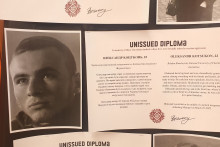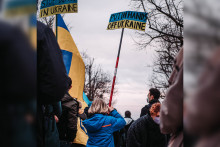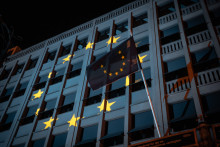Yevheniia Babakova (20), Kherson State University, killed by a Russian airstrike on Mariupol on 9 March, 2022. Leah Krylova (20), Mariupol State University, a Russian shell hit her father’s house directly. Leah and her whole family were all killed. Two of the 36 stories hanging on the wall in the Bastille for the next two weeks. A name, a story, a photo and a diploma. A diploma that the 36 students themselves will never face because Russian aggression took their lives.
Verification
The idea to tell the 36 stories arose recently at the University of Toronto. A group of exchange students from Ukraine wanted to commemorate exactly one year of war there on 24 February. More than 45 universities worldwide joined the idea, including UT. 'A student friend from Toronto approached me, whether I wanted to set up the exhibition at my university. I didn't have to think long about it. I thought the idea was incredibly strong. Besides, they had already put a lot of work into approaching families for verification and asked the universities to arrange the students' diplomas,' says Konashchuk.
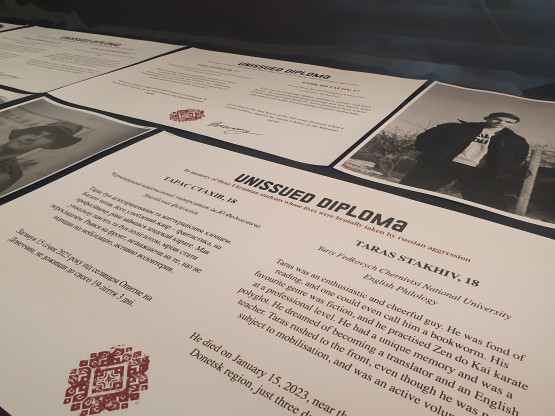
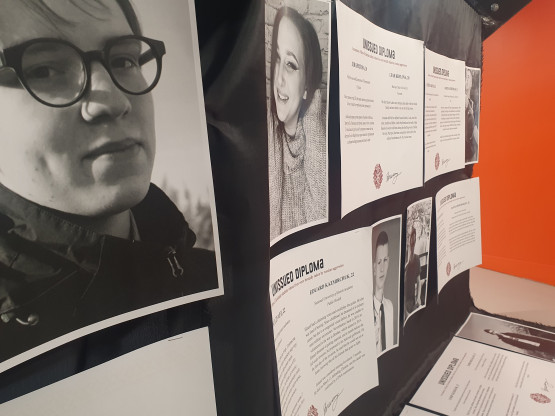
She shared her idea in some group apps and less than half an hour later a team of six committed students formed. Some Ukrainian, but also from other countries, including a Russian student. 'The exhibition appealed to me because the stories are short but very impressive. I recognise myself in the students, only they can never finish their studies. I have not been able to read all the stories yet because it is too emotional.'
No Ukrainian flags
The Business Information Technology student hopes to achieve two things with the exhibition. She hopes to create awareness that the war is far from over, as wars quickly lose attention. 'Friends in Toronto had told fellow students about the exhibition. They looked surprised because they thought the war was already over. Instead, we are already a year on and the war is still as heavy as during the first day.' In addition to creating awareness, there is also the possibility to donate money for the Ukrainian army, but Konashchuk stresses that the students' stories come first. 'It is not a fundraiser. That's also why we don't hang up Ukrainian flags. Then some people quickly think: 'I know that story by now'. The exhibition is all about the killed students, but we do gather donations for Ukrainian Armed Forces.'
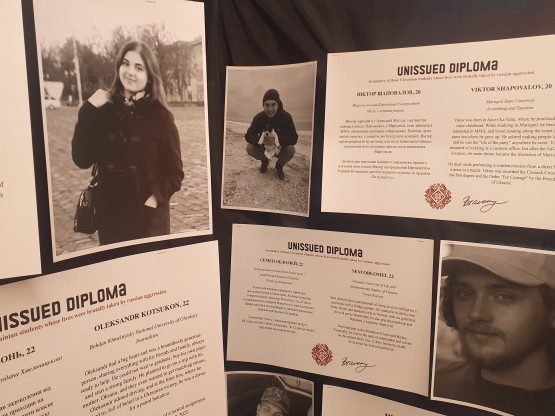
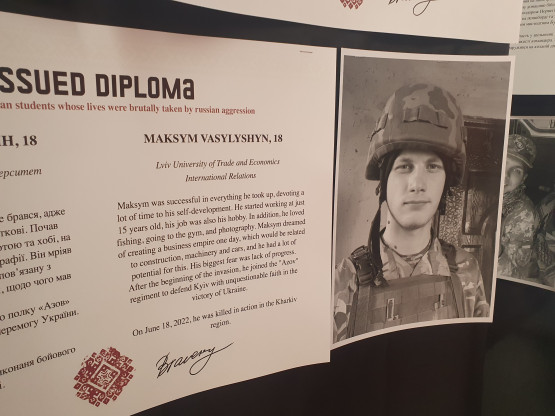
Konashchuk feels it is important to mention that the 36 examples are not all stories. 'These stories the organisation could verify. I told my mother about this idea and she asked if her best friend's son was part of the exhibition. He died last year, but his story is not included. There are hundreds of similar stories like that.'
One year of war
Exactly one year ago, Konashchuk told what Russia's invasion of Ukraine did to her. A month later, she revealed that - however contradictory - she was already used to war. 'That is still true now, but it is not normal to be used to war.' Since the invasion, the student visited her country twice. Once in November and at the New Year she visited her parents in capital Kyiv. 'I thought I had prepared well mentally. I knew I would feel fear and hear explosions. Once there, I found out that you cannot prepare for something like that. On New Year's Eve, a rocket went off nearby and I heard a real explosion for the first time. I totally panicked, but my friend and people walking with children in the park remained so calm. It's unimaginable. The nearest shelter was a 15-minute walk away, so I didn't need to worry so much.'
Konashchuk's parents are doing well under the circumstances and have no plans to leave the capital. Her father recently started an education with the army because he wants to do more for his country. Her mother cooked for soldiers during the start of the war. 'They want to keep helping. In the beginning, that was difficult for me. I was scared and wanted them to stay in the shelters all the time, but they refuse. Fortunately, I am in good contact with them. The same goes for the Ukrainian community at UT. The contact among them was already good before the war, but it has only got better.'

Viktoriia Konashchuk, exactly a year ago in Enschede.


